8. Thelma & Louise (1991)
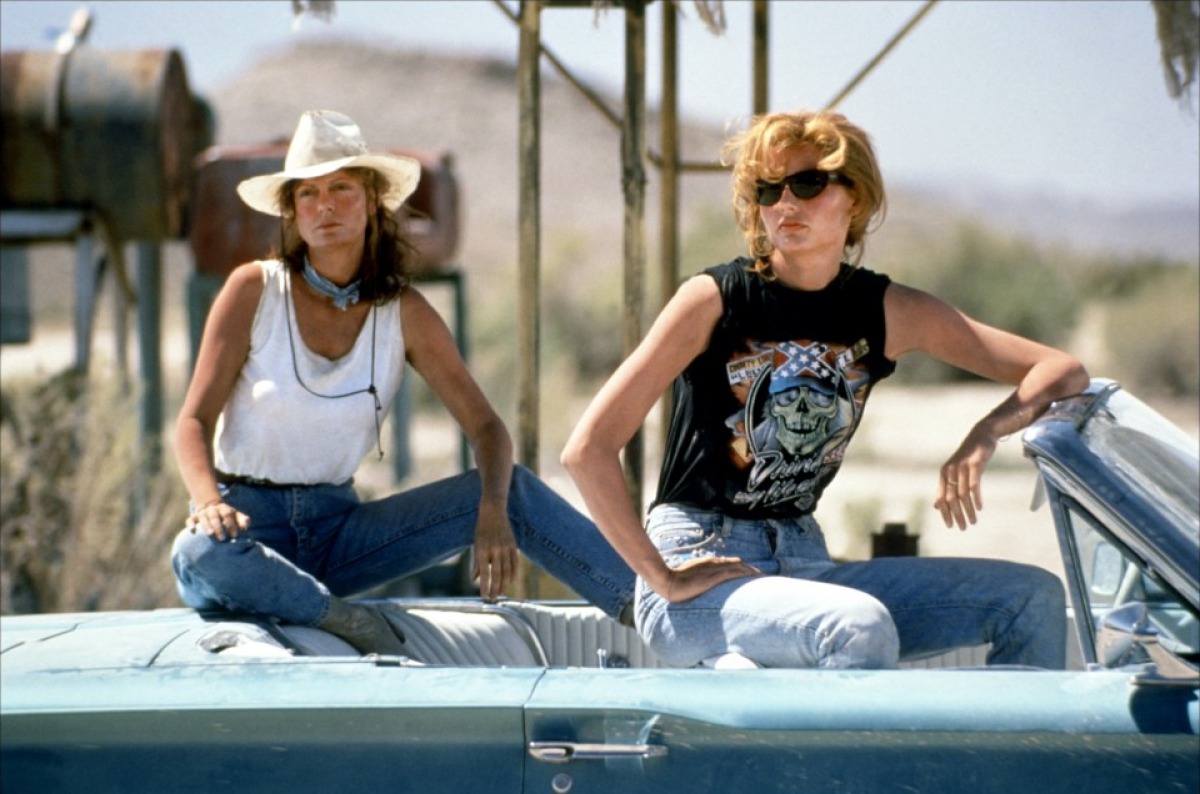
With a talent for finding the humanity within a larger scope, Ridley Scott has created some masterpieces in his career, but in Thelma & Louise, he reigned in his proclivity for painting on a large canvass to instead focus on two women living on a decidedly human scale. In this case, it’s the story of two women who go on a road trip together to escape their lives for a while, and–after murdering an attempted rapist–soon find themselves on the lam.
Perhaps the most unusual thing about this movie is that Scott directed the film: now seen as an icon of feminist film, one must wonder what the director of such macho films as Black Rain and Blade Runner was doing. But this would be forgetting that Scott was also responsible for the sci-fi feminist icon Ripley coming to life on the big screen.
It’s also one of his films where the script seemed to hold his attention more than his own visuals, as the impeccable writing of Callie Khouri (who won Best Original Screenplay at the Academy Awards that year) is captured with vibrancy and interest, while the grand landscapes of America’s southwest serve as the perfect background–with its skies that come right down to the ground–for two characters breaking free for perhaps the first time in their lives.
Nominated for several Academy Awards and selected for preservation by the Library of Congress, this unexpected entry in Ridley Scott’s oeuvre is also one of his most impactful on Western culture.
7. Legend (1985)
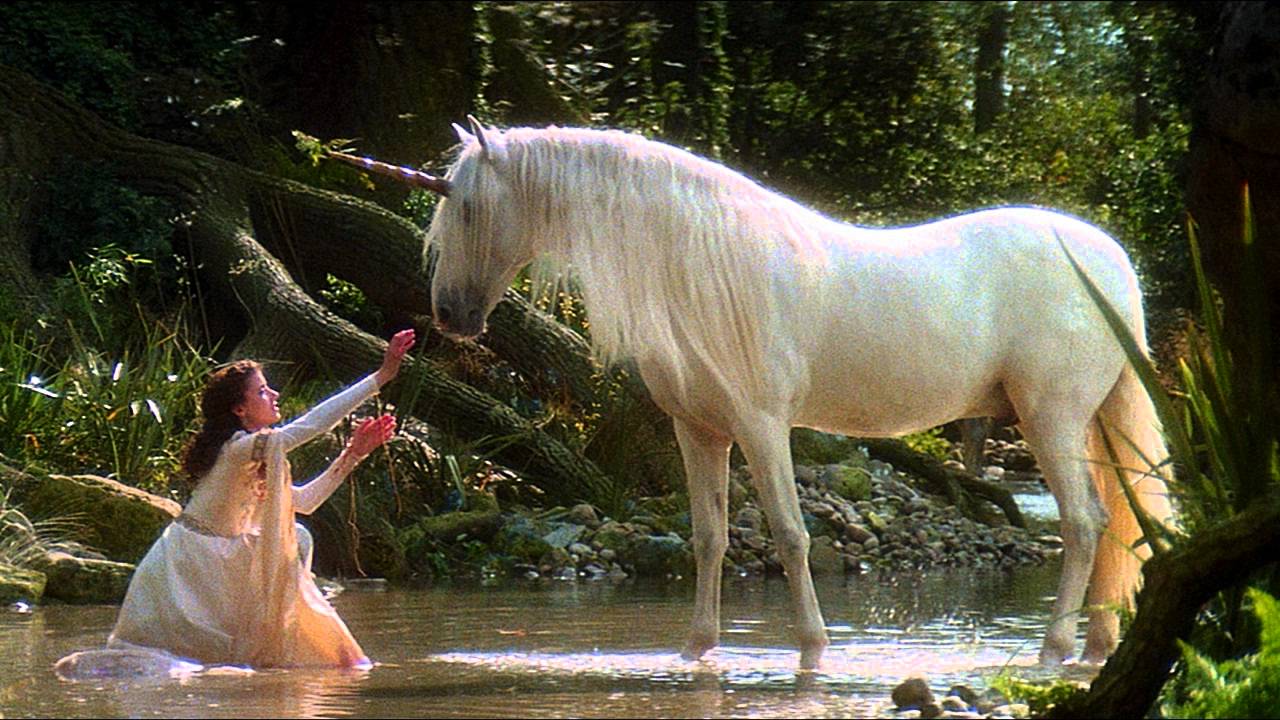
“World building” is a buzzword that’s applied to seemingly every TV show and film that makes an attempt to create a holistic setting for its fiction to occur, but some filmmakers have been creating worlds for decades before this concept became well-known. Legend is a perfect example of this: a film that brings to life such concepts as darkness (as an entity), unicorns, elves, and goblins, it’s an undeniable fantasy that is brought to meticulous life by Ridley Scott.
The story itself sounds silly when boiled down to its essence: Darkness (Tim Curry) threatens to bring eternal darkness to the world, so two light-bearing unicorns seek out pure members of the forest, Jack and Princess Lily (Tom Cruise and Mia Sara). When these two pure beings are separated, it’s up to Jack to unite the woodland fairies to bring Darkness down and rescue the princess.
But the film’s simple story belies its quality: it’s a visually stunning film, atmospheric and ethereal and absorbing to the viewer. Although now 32 years old, its practical effects still hold up (Curry as the 7-foot-tall Darkness in particular is striking).
While it may be a purely fantasy film, if measured against similarly dreamy and exalted fantasies of the time such as The Dark Crystal and Labyrinth, it more than holds up its end of the bargain. While much of his work tiptoed around the edges of the fantasy genre, Legend is Scott’s full-fledged entry into the genre–and a completely successful one, at that.
6. Black Hawk Down (2001)
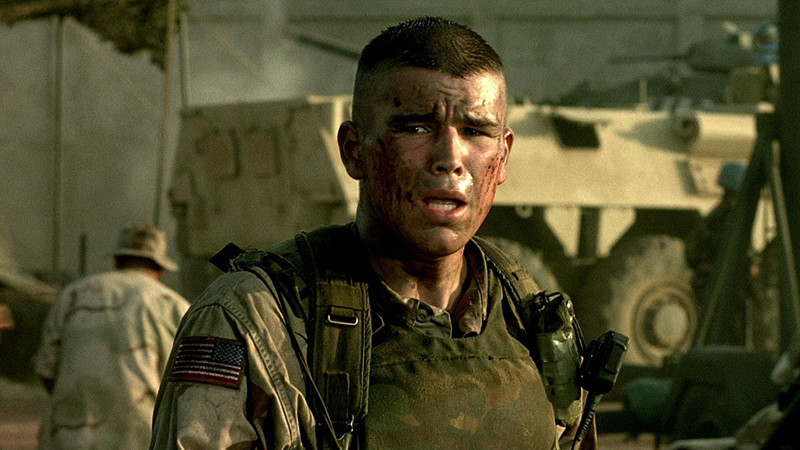
Now a nearly forgotten footnote in history, the Battle of Mogadishu was big news when it first occurred, particularly for the real-life drama that unfolded amidst its participants: after a major humanitarian crisis broke out in Somalia due to civil war, exacerbated by various factions hijacking food supplies supplied by the UN and intended for citizens to trade for weapons, which lead to mass casualties and displacement due to starvation, the US strategized a military operation to restore order once again to the war-torn country.
During the assault on Mogadishu in 1993, a Black Hawk helicopter crashed behind enemy lines, which led to a risky extraction operation that led to heavy casualties on the American side.
Adapted from the book of the same name, Black Hawk Down is a fierce depiction of war and the heat of battle strengthened by Scott’s frenetic depiction of the visceral and terrifying violence of combat. Highly praised upon its release, Black Hawk Down remains a contemporary classic of the brutality of modern warfare while also highlighting the professionalism of its participants.
Released just months after 9/11, the film was a box-office hit while also drawing criticism that it was a pro-interventionist, pro-war tract. However, when viewed outside of this historical context, it’s one of the best films about modern warfare made in the 21st century.
5. Gladiator (2000)
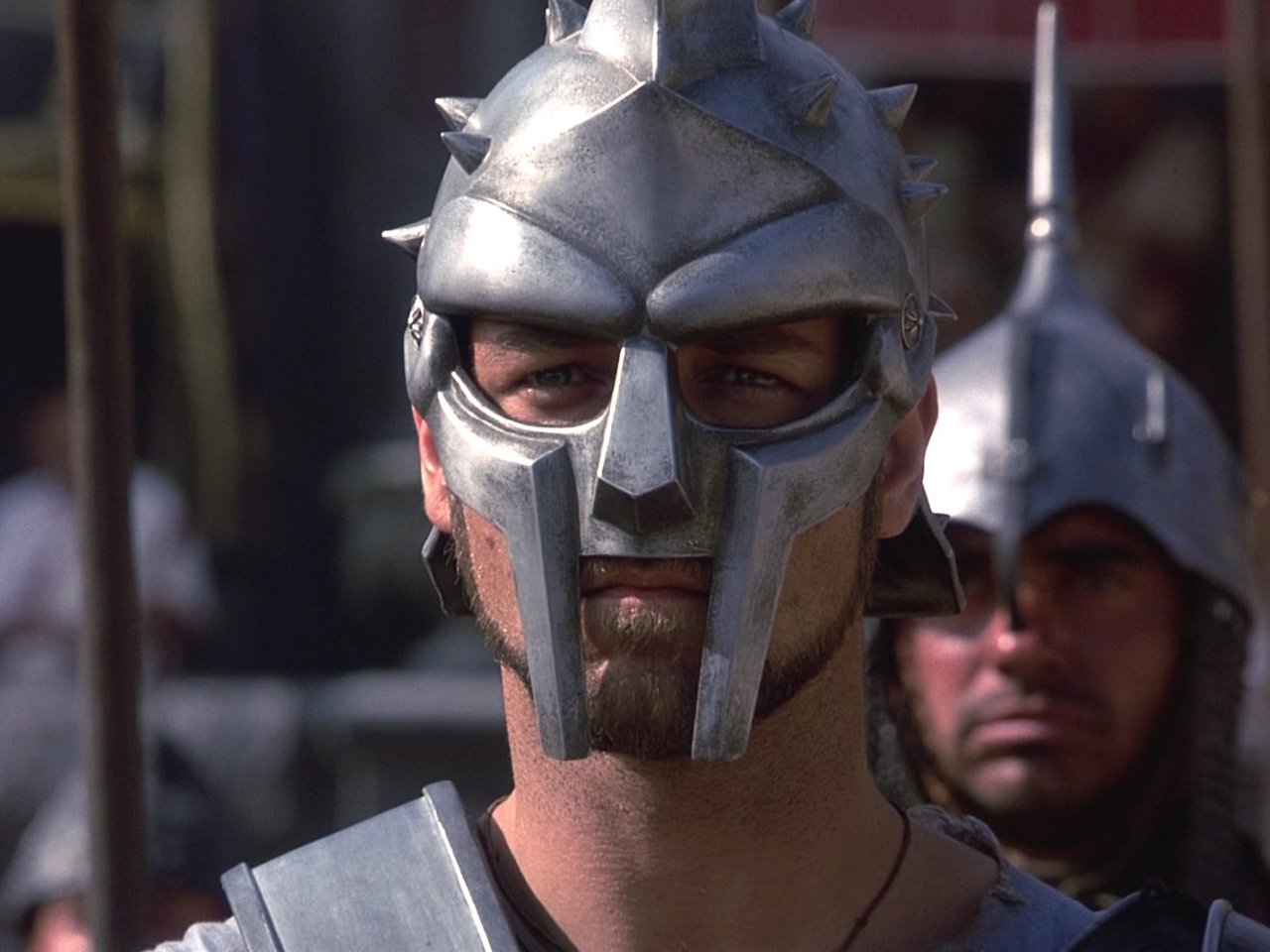
After leading his men into a decisive victory against Germanic tribes, Roman general Maximus wants to retire and return home to his estate where his wife and son are waiting for him. However, Emperor Marcus Aurelius wishes for him to become regent to prevent the empire from falling into corruption, which it most assuredly would under his unscrupulous son Commodus’s reign. His son instead murders his father and places Maximus under arrest, sentencing him to death.
Maximus escapes and returns home, only to find his house burned to the ground and his wife and son murdered. Caught as a slave, Maximus enters gladiatorial combat and soon rises to fame through a stunning series of victories. What follows includes plots to overthrow the government, Commodus’s own personal antagonizing of Maximus, and the potential reform of Rome under tragic circumstances.
A sweeping epic of which Ridley Scott is adept at, Gladiator mixes two of the director’s greatest strengths–tracking a hero’s journey through extraordinary circumstances and building a detailed, all-encompassing vision of the world–and created both a blockbuster and a work of art.
The influence of this movie–which won both Best Actor and Best Picture at the Academy Awards–was so great that it renewed interest in Roman culture and history, influenced a wave of historical epic films in its wake, and remains a modern classic.
4. American Gangster (2007)
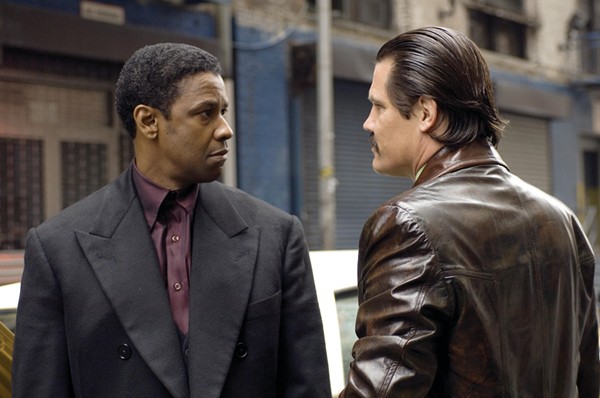
In the late 1960s, Frank Lucas (Denzel Washington) inherits the crime syndicate in Harlem and proceeds to build a heroin empire that imports a potent brand of the drug via returning servicemen from the Vietnam War. As his business thrives, detective Richie Roberts (Russell Crowe) begins to investigate the suddenly prosperous Lucas and his business dealings.
As Roberts gets closer to discovering Lucas’s operation, Lucas is faced with his own problems as the Vietnam War draws to a close and his cheap supply is suddenly cut off. How the story concludes, however, is far from ordinary, and this biographical story proves that truth is stranger than fiction.
In this film, Ridley Scott again finds a balance between his larger-than-life directorial predilections by having two larger-than-life characters fill the screen instead. Both Washington and Crowe give incredible performances, while the riveting story was authentically supported by Scott’s attention to historical detail, bringing the gritty 1970s cityscape to life.
A smarter gangster picture than most, it’s also the mark of Scott’s versatility as a director, in particular knowing when to get out of his own way when his actors are all the spectacle he needs on screen.
3. The Martian (2015)
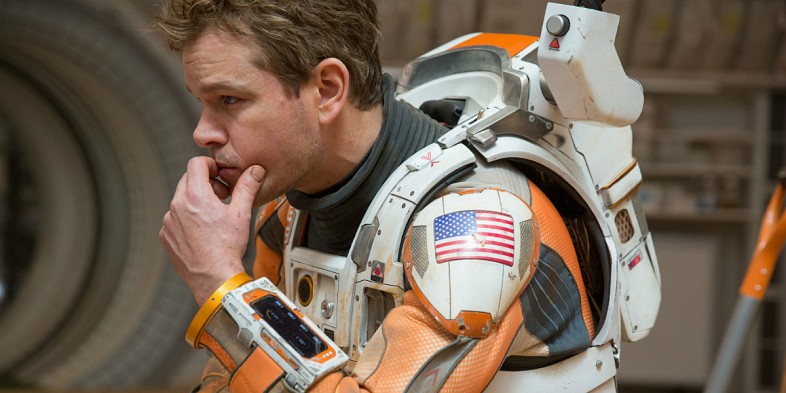
A mission on Mars is abandoned after an unexpected dust storm threatens to destroy their habitat: one crew member is left behind and assumed dead. However, astronaut Mark Watney (Matt Damon) is made of stronger stuff, as we see in 2015’s The Martian. Now abandoned with a damaged habitat, Watney goes about figuring out how to survive in this inhospitable climate, rebuilding and refining his techniques as he goes along, and figuring out how to get back in touch with Earth to let them know that he’s still alive.
And while Watney has figured out how to survive, rescuing him is going to be much more difficult–not that he (and everyone else) can’t figure out a way for that to happen, as well.
The Martian is no less than an astonishing piece of science fiction that works in the confines of scientific fact. An engineer’s dream, the character Mark Watney is resourceful, smart, and above all affable character to carry this film. Nearly a one-hander, Damon keeps the audience engaged as he figures out how to farm, shield himself from the outside, keep himself sane, and ultimately escape his harrowing situation.
Ridley Scott was the perfect director for the film, as well: besides his penchant for technology and outer space, from his filmic output Scott seems similarly obsessed with how to create practical solutions for impossible situations. Enjoyable throughout, with a great pop sensibility, this may be Scott’s most commercial film–and enjoyable one, to boot.
Just as in Gladiator, we watch as our protagonist is placed in an incredible situation and extraordinary circumstances–only here, he has to figure out how to survive instead of simply fighting his way out of it. Beautifully shot, ingeniously conceived, and captivating throughout, The Martian is one of Ridley Scott’s best films and perfect for any hard sci-fi fan.
2. Alien (1979)

Maybe the most groundbreaking sci-fi film of the past 40 years, Alien does away with any notions of an extraterrestrial as possibly being our friend–or even our enemy. After all, to be a true enemy, one must have some larger purpose in mind. Instead, the ET encountered in this movie is an instinctual killing machine whose only purpose is to destroy and reproduce so that its spawn can continue to destroy.
This is what cargo ship Nostromo and its crew find when they are awoken from stasis and redirected to a planet to investigate an alien ship. Inside, one crew member is attacked by a creature that emerges from an egg, which attaches itself to his face. Later, after the creature detaches, the crew member seems fine until another creature bursts through his chest.
After failing to capture this new entity, the crew finds themselves being picked off one by one by this alien, which has now grown full-size and is decimating the crew. Our sole survivor Ripley (Sigourney Weaver) sets the ship to auto-destruct, but that’s not quite the end…
Summarizing this film seems useless at this point: it’s one of the most well-known sci-fi/horror films ever made. Having spawned 3 sequels, a prequel, and now an upcoming sequel to that prequel, Alien is perhaps Ridley Scott’s best-known film. And it’s a masterpiece: the set design, atmosphere, conception of the alien creature (itself iconic), and increasingly dark and suspenseful story has been repeated, copied, and inspired generations of filmmakers to come.
The look, tone, and graphic nature of Scott’s film forever changed what a sci-fi film could be, and the character Ripley has since become a feminist icon. Although known as a sci-fi director, in truth (as this list bears out) he’s only made a handful of science fiction films in his career–but this film (and the next one, of course) is why he’s known best for that genre.
1. Blade Runner (1982)
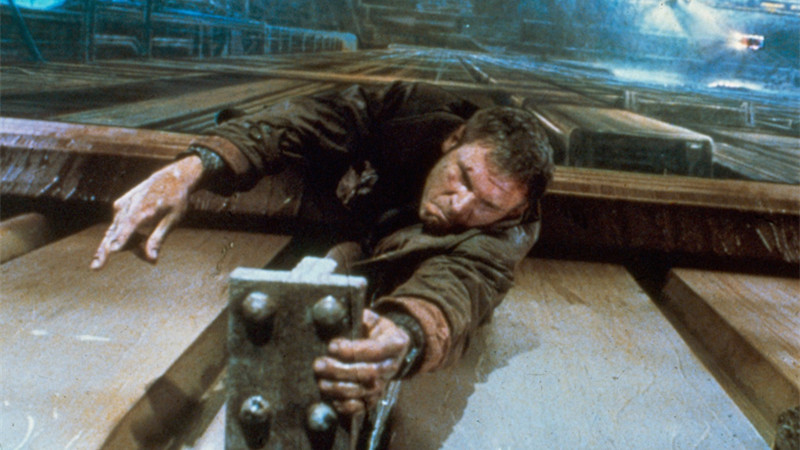
After Scott’s film career comes to a close–whenever that may be, since he’s still directing films–he will be remembered for only a few of the many interesting films he’s made over his career. But perhaps most of all, he will be remembered for Blade Runner.
A complex vision of the future that had never been seen before in cinema, Blade Runner takes place in 2019: with the world in environmental collapse, technology has become both advanced and retrofitted to available machinery; a majority of the population lives in squalor while wealthier members of society are escaping into space.
While we’re just two years off from the year the film is set in, and our world isn’t in such an advanced (or dilapidated) state, it’s not difficult to envision 2050 looking like Los Angeles does in this movie.
Blade Runner is a noir-ish detective story, where our protagonist Deckard (Harrison Ford) is a “blade runner”–a bounty hunter that tracks down escaped androids, or “replicants.” And he’s good at his job; but the replicants he’s seeking are better and smarter than what he’s used to. What’s made the problem worse (and personal) for him is that he’s fallen in love with a replicant named Rachael (Sean Young).
What’s more, these advanced machines are self-aware and know they have outlived their purpose–and film lets the viewer know that these aren’t just mindless robots but creations with depth and even soul, who want nothing more than to keep living. By the end of the film, even Deckard sees this as he absconds with Rachael to live further than she’d been programmed to.
The film is an aesthetic treat, as well: it accomplishes building a futuristic world that also seems familiar and lived-in to the audience. Ridley Scott–always the consummate director–controls the tone of the film like a well-tuned fiddle, showing constraint for atmosphere and creating a visual dynamic that, being both neo-noir and science fiction, is both classic and groundbreaking.
You could watch Blade Runner with the sound off and still enjoy how he lights a scene, frames a shot, and keeps its visual grammar consistent throughout. It’s a true vision by a visionary director.
A box office disappointment upon release, it was sent out into the home video market, hoping to turn a profit. And then something strange happened: it began to be recognized as the truly remarkable film it is. Genre fans hailed it as a great sci-fi/noir film, its visuals were studied (and then copied) by future filmmakers. It’s one of the best sci-films ever made, and for a director who’s made a career’s worth of fantastic films, it’s the best film Ridley Scott has ever made.
Author Bio: Mike Gray is a writer and academic from the Jersey Shore. His works have appeared on Cracked and Funny or Die, and he maintains a film and TV blog at mikegraymikegray.wordpress.com.